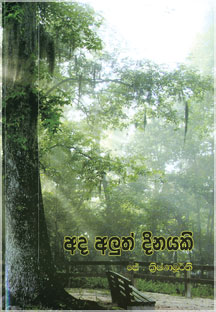Focus on books
A thought provoking gift for all times
Professor Sunanda Mahendra
Ada Aluth Dinayaki
(Freedom from the Known)
J. Krishnamurthi
Translated by Professor Mahinda Palihawadana
Sri Lanka Krishnamurthi Centre
Rs. 200. 176 pages
The world reknown philosopher and teacher Jiddu Krishnamurthi
(1895-1986) made an impact on the Sinhala readers via the translations
of his books and the various recorded lectures sponsored by the
Krishnamurthi Centre in Sri Lanka.
Quite a number of his lectures, inteviews and discussions found in
English originals have been translated by some of the Krishnamurthi
admirers, into Sinhala. As such the Sinhala reader is familiar with the
Krishnamurthi thought and expression.

One of the significant translations which I came across recently
happened to be the translation of Krishnamurthi insights titled in
English as ‘Freedom from the known’ into Sinhala as Ada Aluth Dinayaki
(today is a new day).
Though I have not read the original work, I found the Sinhala
translation by Professor Mahinda Palihawadana, quite thought provoking
and page moving. The original work, according to the translator
Palihawadana, consists of transcriptions of Krishnamurthi speeches
collected in the form of an anthology or a reader by Marie Lukyens in
1969.
The original work as well as the Sinhala translation of sixteen
chapters itemised under various subtopics of human interest. The first
chapter is an insight into the working of the human mind in its manifold
ways. It covers how the humans find it difficult to release from the
bonds of the mind.
I am not too sure whether the terminology I use here is the same as
found in the original. But it is not difficult to know what
Krishnamurthi tries to express. The second chapter perhaps takes the
reader into a further frame where he is taught as to how the mind could
be released of this entrapment.
The social issues such as desire, happiness and various other factors
that pollute the mind are discussed. As a Buddhist, I found some
similarities in the teaching of the Buddha as laid in such religious
texts as Dhammapada, about which we have discussed earlier in this
column.
Krishnamurthi is best in his examples that clarify the issues that
make the man go wild and violent. These factors are vividly described in
chapter seven where the central issues are directed to the calamities
that spring up due to the mind being driven to addictions such as the
use of drugs.
I found the issues discussed on non-violence and the happiness via
self-contentment quite resourceful insights. He gives examples of how
one could move into an uneasy discomfort as a result of the unfulfilment
of his desires (43pp).
He asks a series of questions. What happens when a small comfort is
prevented? You tend to enter into doubts, jealosies and hatreds.
Similarly what happens when one is prevented from sex desires and the
enjoyment of intoxicants? One tends to get into a realm of fear.
Similarly what happens when a person is prevented from expressing his
feelings? (43pp)
In this manner Krishnamurthi’s manner of quesions gives way to a
logical research of one’s inner feeligns. The aspects of violence that
disrupts the sanity of life is discussed broadly in the same manner
(63pp). The violence, which according to Krishnamurthi, has to be
understood as an existing entity (63pp). One has to perceive the fact
that he or she is a possessor of this entity called violence. This has
to be understood he says as a factor that is lying beneath oneself
(64pp).
For the sake of clarification the translator Professor Palihawadana
traces as far as possible to present the original usages of
Krishnamurthi. In his preface he says that though the original work
touches the sensibility of the reader, it is far too difficult to
communicate in a simplified manner.
Sometimes zen stories are used by Krishnamurthi to illustrate his
disussions (145pp). He discusses topics such as communication, positive
thinking, discipline, silence, truth and reality (chapter 14). I felt
that the discussions lead to poetic visions and sensitivity.
The most significant factor, as I see, in Krishnamurthi is the clever
use of logic via a verbal pattern inherent to him. Whether you agree
with him or not is not the question. It is a question of the clarity of
expression, an issue which needs major attention. As Krishnamurthi says
the thought is not a new phenomenon. It is dependent on the memory
experience and knowledge, one gains as a response (42pp).
From here onwards he goes on to discuss at length each of the
concepts of memory, experience and knowledge. Krishnamurthi is seen as
an explorer of common factors hitherto unexplored by others. They look
striking full of feelings and presumably a journey into the existence.
You may keep on reading Krishnamurthi, you may stop at a particular
point and ponder over in silence. Then you may resume from where you
stopped. In this manner it is a tireless journey in silence and a gift
for all times.
He re-questions issues on wars, revolutions, victories and defeats.
He helps you to rethink of the nature and your place therein. Though
brief, the biographical account added by way of a preface is useful. We
come to know that he had visited Sri Lanka several times. |

